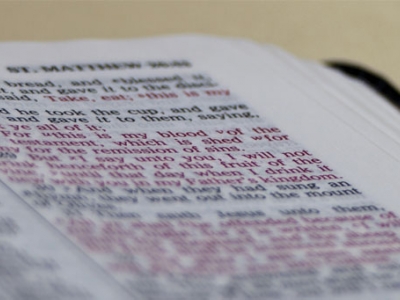
Disciple-making starts at home
The Bible is clear that parents bear the primary responsibility for discipling their children. But what exactly is discipleship? And how can parents go about it?
Before he ascended to heaven, Jesus left his disciples with the Great Commission to ‘go and make disciples of all nations’ (Matthew 28:19). The early Christians prayed and worked to spread the gospel outwards to the ends of the known world; but they also took responsibility for passing the gospel downwards to the next generation.
But who exactly is responsible for this downward disciple-making—is it the church or the family? The Bible—in both Old and New Testaments—makes clear that it is parents who bear the primary responsibility for discipling their children. But in our modern world we don’t always live this out.
A recent report into the exodus of young people from our churches concluded: ‘The missing ingredient in the discipleship of children today appears to be the family. As a result the church has increasingly begun to operate as the primary means of spiritual development of youth and children, as parents have begun to relinquish or “outsource” that role’.1
So what exactly is discipleship? What is our role as parents? And how can we go about it?
What is discipleship?
Discipleship is the process of forming or shaping a person’s heart, mind, goals, habits, character and behaviour towards a certain end. As Christians, that end is to grow in the likeness of Christ, who is the perfect image of God. Disciples of Jesus are gradually learning to share his values, attitudes, goals, habits, character and behaviour: we’re learning to honour God the way Jesus honours him, and we’re learning to love other people the way Jesus loves them. As we do this, we will become not just mature Christians, but mature human beings, reflecting the image of God as we were made to do.
Another way to describe discipleship is an apprenticeship: Jesus is our Master Teacher and we are gradually learning his trade.
When Jesus was on earth, he took on twelve disciples—or apprentices. Jesus walked beside them showing and teaching them the ways of God. The disciples were slow learners, but their Teacher patiently led them on towards greater understanding, greater faith and greater responsibility. Jesus trained his disciples, letting them try—and fail—until finally they were ready to take over his mission on earth, with the empowering of his Spirit.
Jesus explained the process of discipleship like this: ‘The student is not above the teacher, but everyone who is fully trained will be like their teacher’ (Luke 6:40).
An apprenticeship is very different to the education we receive in a modern school or university. Firstly, an apprenticeship is more personal. University lecturers stand in front of hundreds of students and probably don’t even know their names. But when a tradesperson takes on an apprentice, they make a personal commitment to pass their knowledge and skills onto that other person.
The second difference is that an apprenticeship is more practical. The teaching happens not in a classroom, but in a workshop. The testing of an apprentice is not whether they can sit an exam, but whether they can do the work.
And thirdly, an apprenticeship is more of a process than an academic degree. The apprentice begins by watching their master teacher; then they start helping with the work and gaining the necessary skills; then they might do some work with the teacher’s supervision and feedback; until finally they are ready to do the work alone.
It’s easy to see how this worked for Jesus’ first disciples. But what does it look like for us today? Our apprenticeship happens as we get to know Jesus and his Father God in the pages of the Bible, as we pray for God to forgive us and transform us by his Spirit, as we meet with other Christians for worship, fellowship and accountability, and as we step out to serve God and point others to him in our homes, churches, communities and workplaces.
What role do parents play in discipleship?
The first thing to say here is that discipleship is for parents first of all: we are undergoing the same kind of apprenticeship to Jesus that we ultimately want for our children. As we follow Jesus, we pass on the things that we learn to our children. The perfect motto for Christian parenting is what Paul says in 1 Corinthians 11💯 ‘Follow my example as I follow the example of Christ’. Our children are our disciples as we lead them to Christ.
So parents are disciples or apprentices of Jesus, who bring their children along behind as their disciples or apprentices. And remember what we learnt about the process of discipleship?
Firstly, it is personal—we can’t outsource this apprenticeship to school teachers or children’s ministry leaders at church. Of course, other people will support and help us in our role, but ultimately it is parents who are responsible for our children’s discipleship.
Secondly, it is practical—we’re not just downloading information about God and his values to our children. We also need to give them opportunities to practise living this out. Discipleship is not just talking, it’s doing.
Thirdly, it is a process—learning a new skill takes time and lots of practice, so that means we need to be patient and persevere with our children. Discipling means giving them opportunities to watch us at worship and at work, then to join us in these things, then to do the worship and work themselves.
How can parents disciple their children?
Here are some of the strategies that the Bible recommends for helping our children to grow in the likeness of Christ, the perfect image of God:
Model your life and faith to your kids (aiming not for perfection, but for growth towards maturity).
Talk to your kids about your life and faith (and ask about theirs).
Teach your kids about life and faith, both at set times and ‘on the go’ as things come up.
Train your kids in the skills of life and faith, giving them opportunities to watch, learn and then practise them.
Include your kids in your local church community.
Discipline your kids by establishing age-appropriate standards, boundaries and consequences.
Filter (or with older kids, discuss) outside influences from television, the internet, school and friends.
Schedule times for family Bible reading and prayer.
(In our next article, we’ll look in more detail at these practical discipleship strategies.)
Making disciples at home is indeed a Great Commission. God has given our children to us as apprentices—we’re tasked with helping to shape their heart, mind, goals, habits, character and behaviour into the likeness of Christ, the perfect image of God. But God hasn’t left us to do this alone. We have God’s Spirit who lives within us—powerfully transforming us and our children to become more like Christ. We have our Christian brothers and sisters walking beside us—ready to support and encourage us in the task. And we have Jesus who goes before us—our gracious Lord and Teacher, who has promised: ‘Surely I am with you always, to the very end of the age’ (Matthew 28:20).
______________
[1] Sarie King, ‘Retention and Transition’, Effective Ministry, p.36
---
Harriet Connor is the Content Editor for Growing Faith and the author of ‘Big Picture Parents: Ancient Wisdom for Modern Life’ (Wipf and Stock, 2017). She lives on the Central Coast of NSW with her husband and three sons.
For more articles from Growing Faith, subscribe to our monthly e-newsletter.
To hear about the latest books and resources from Youthworks Media, subscribe here.








